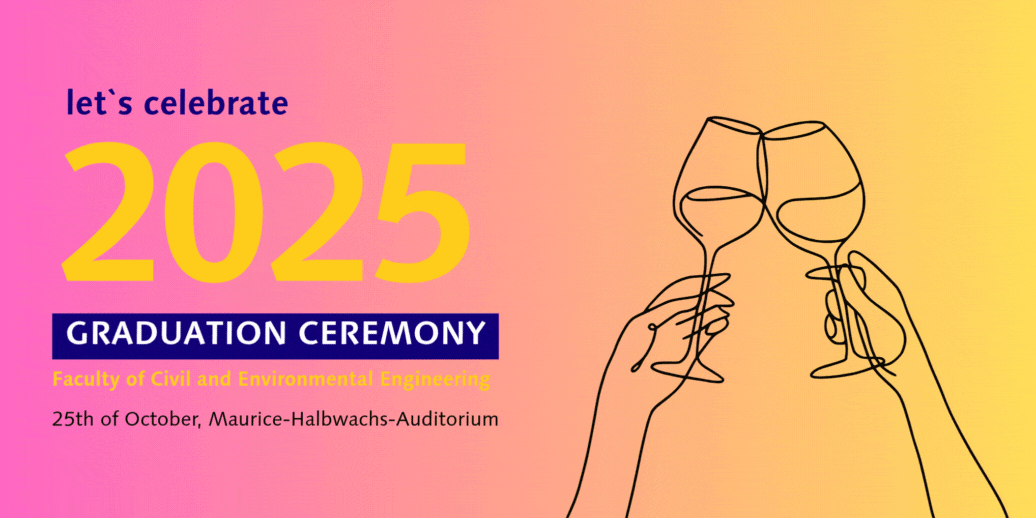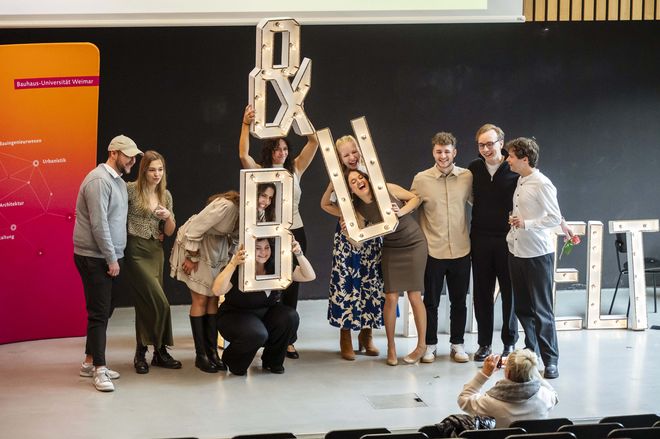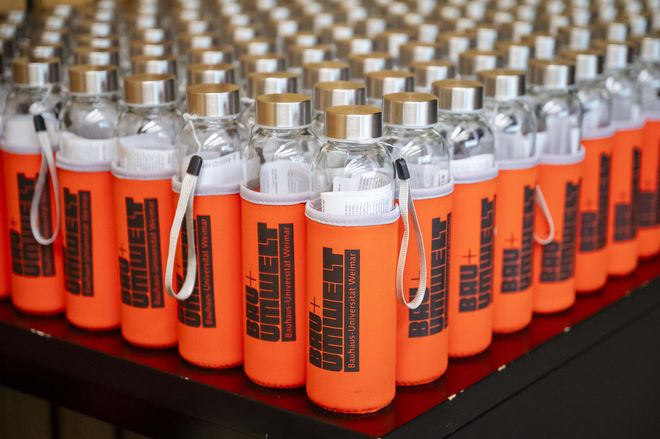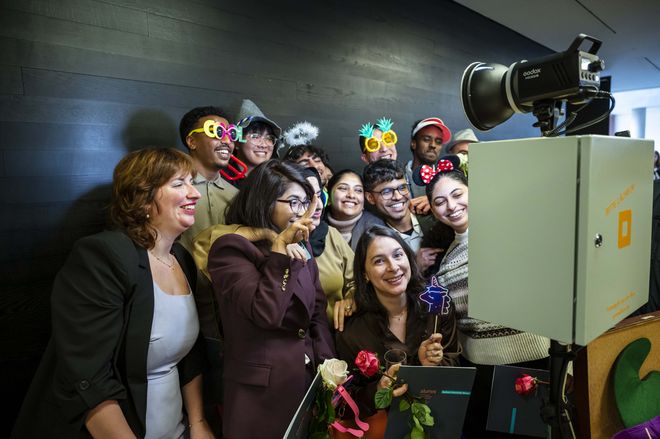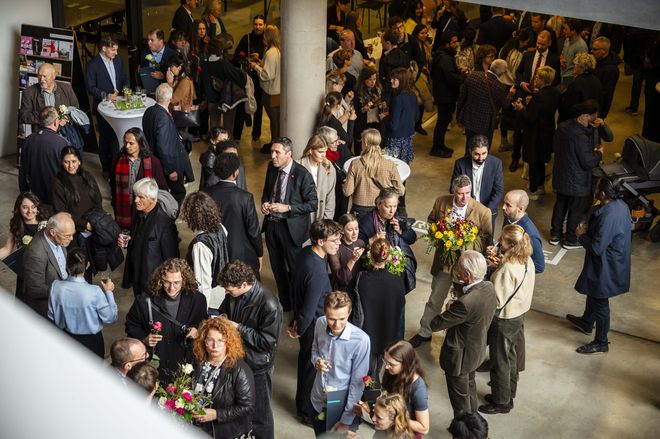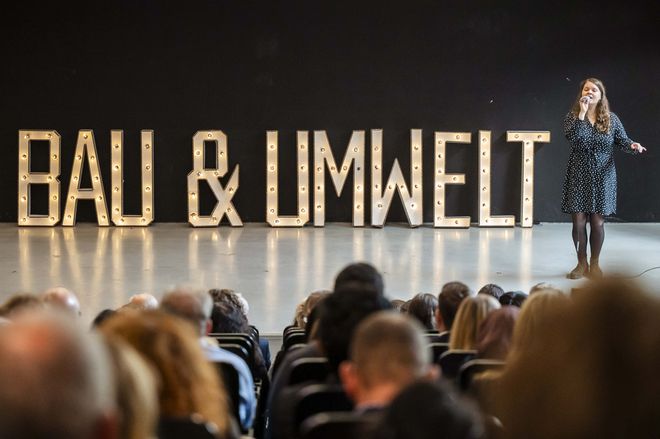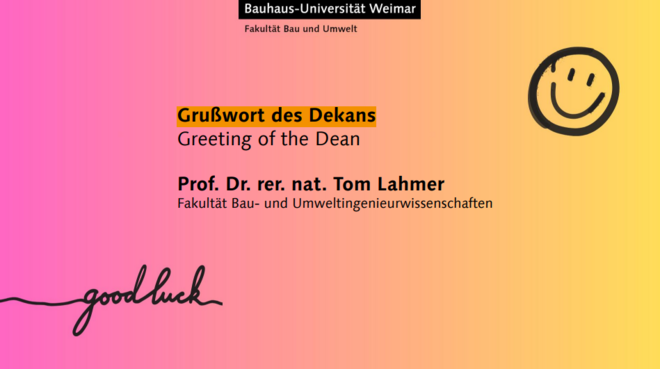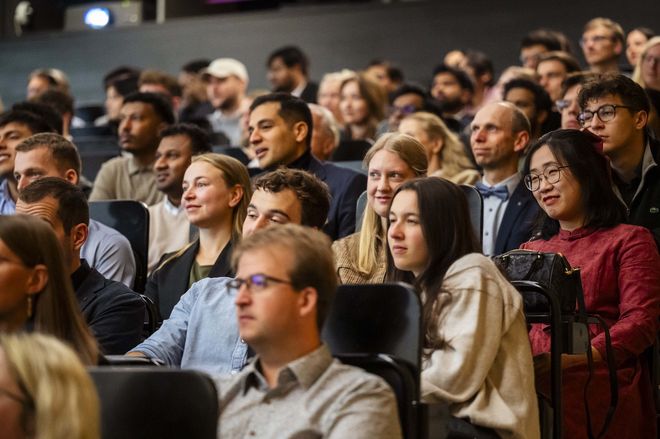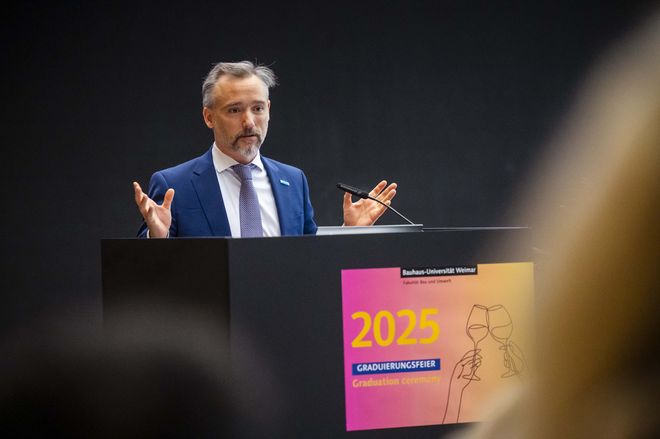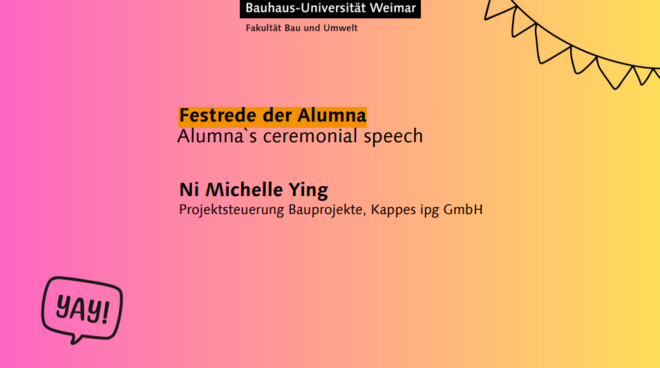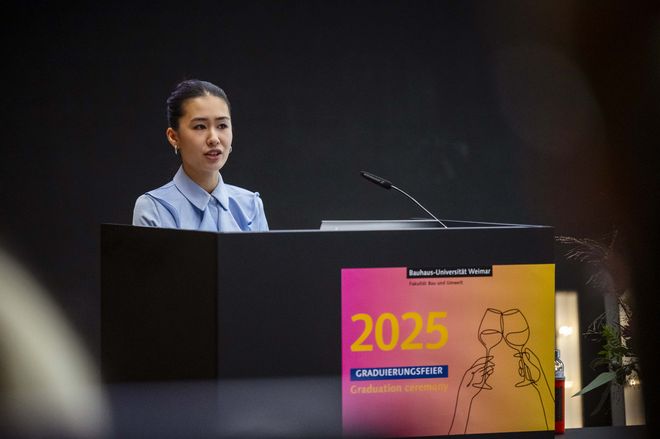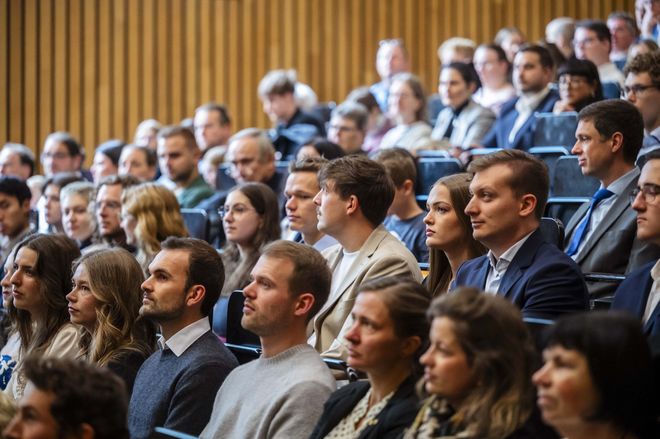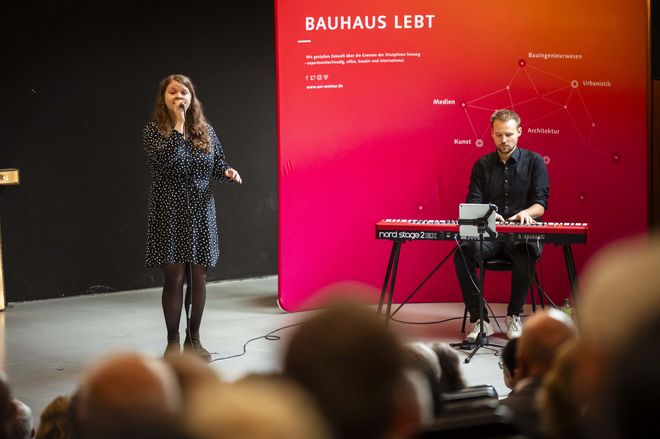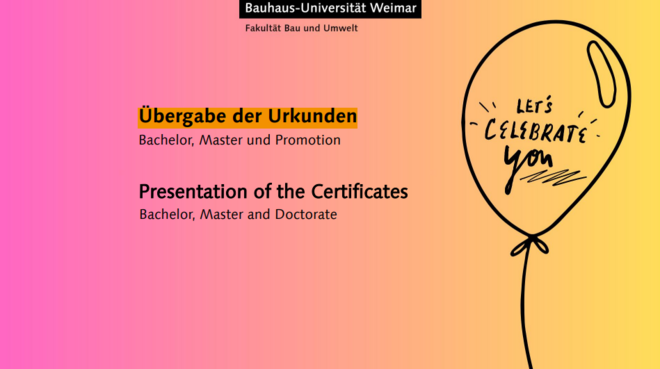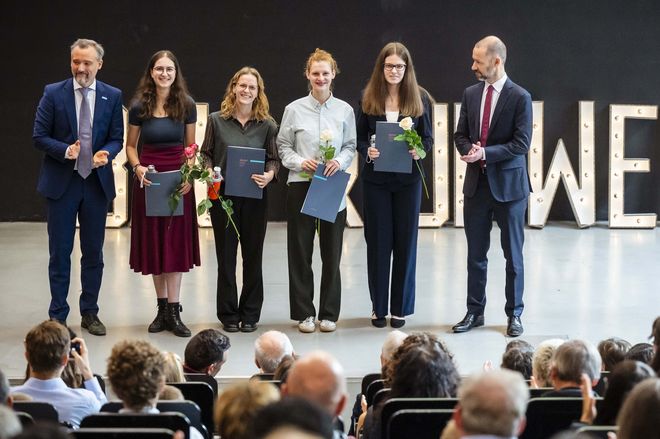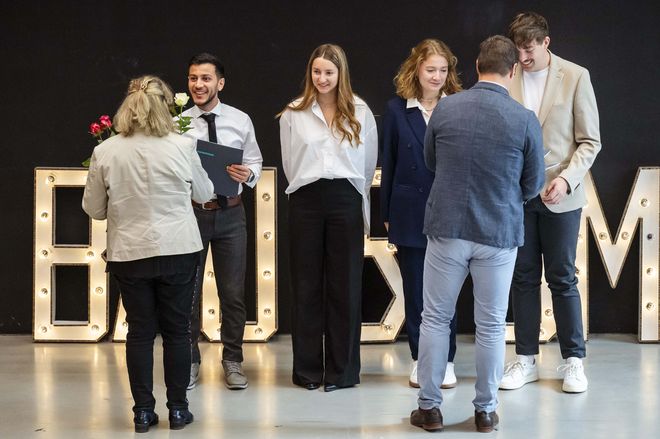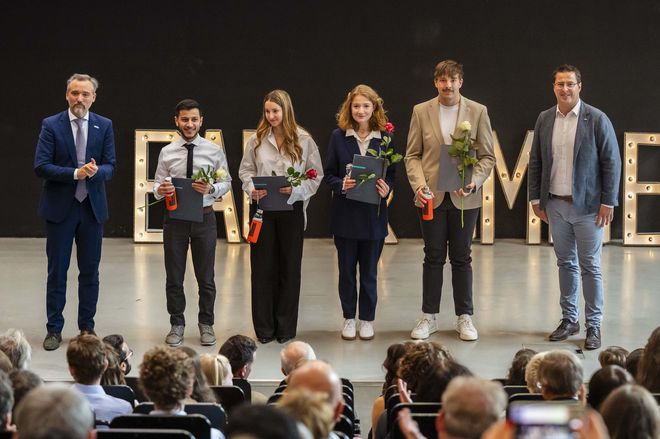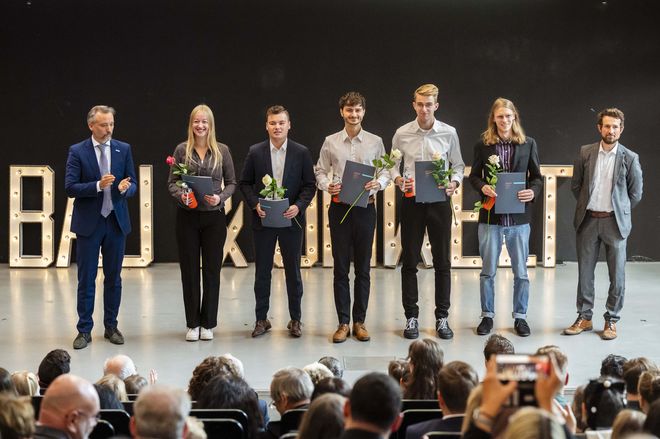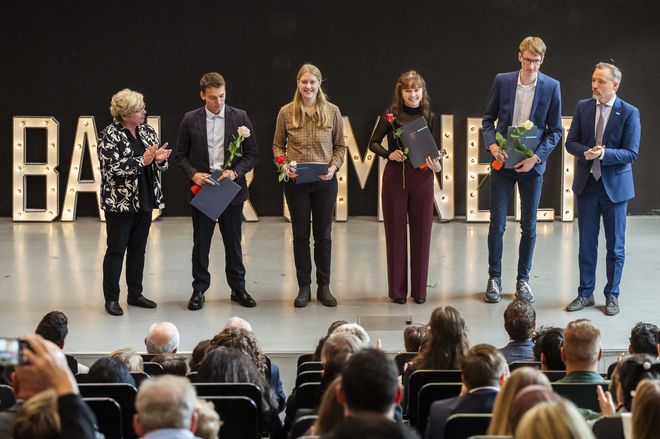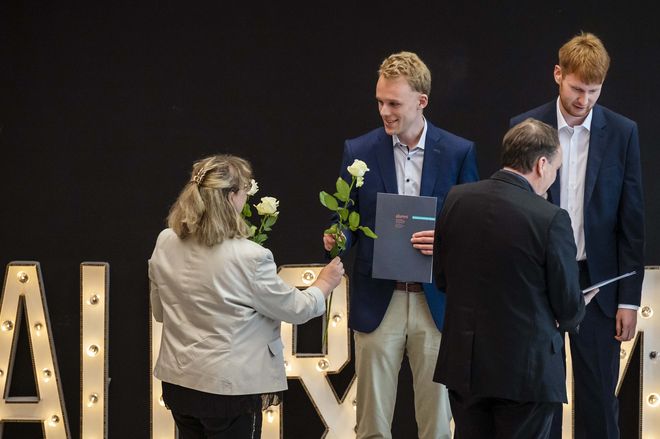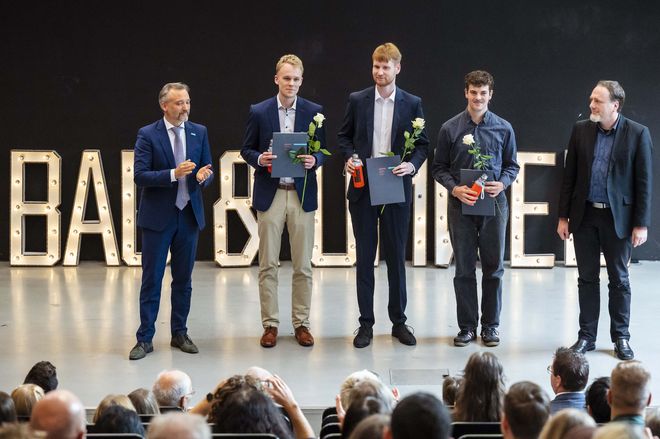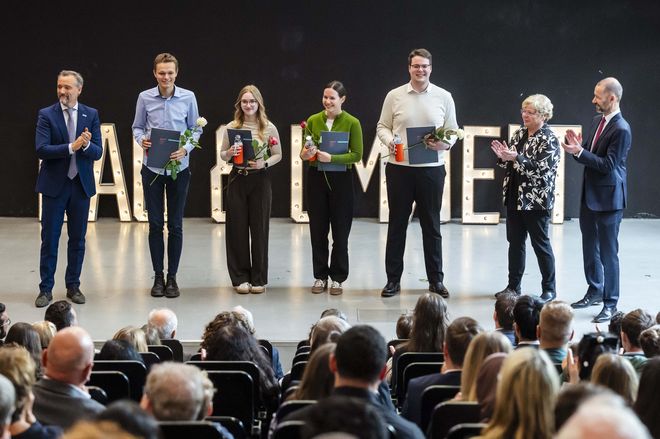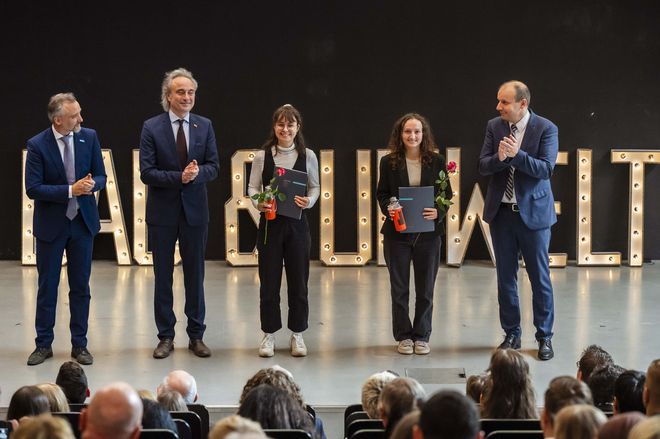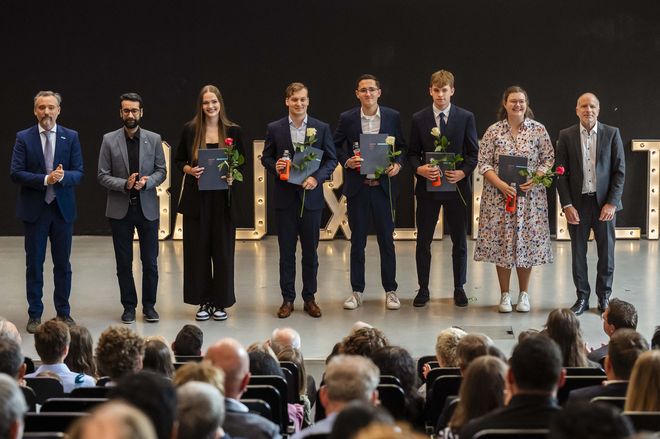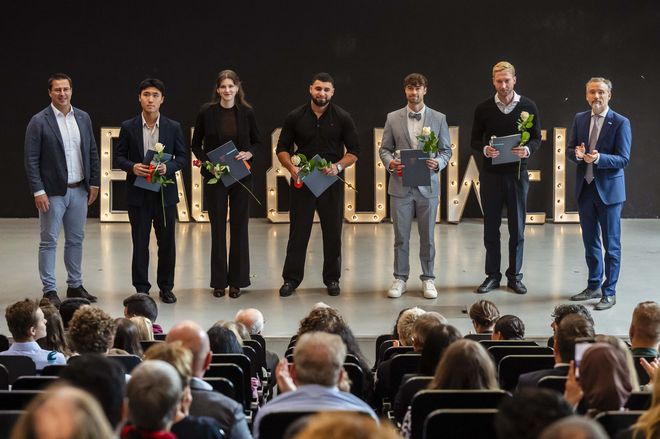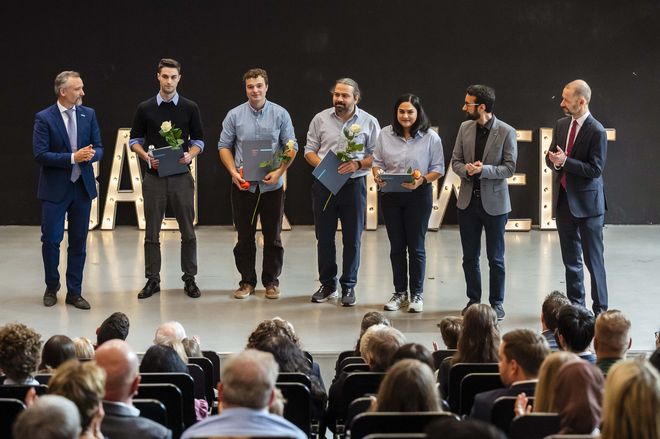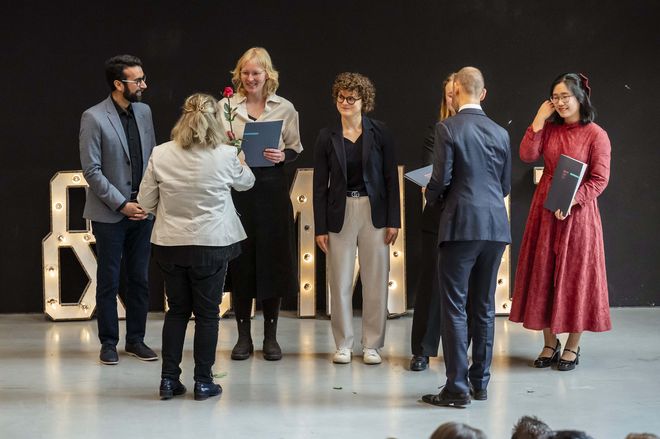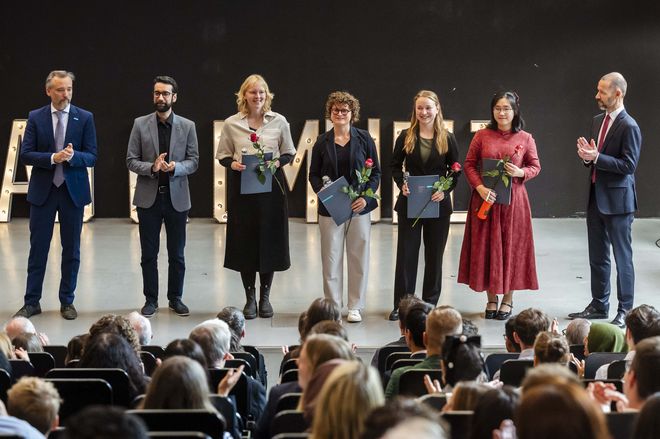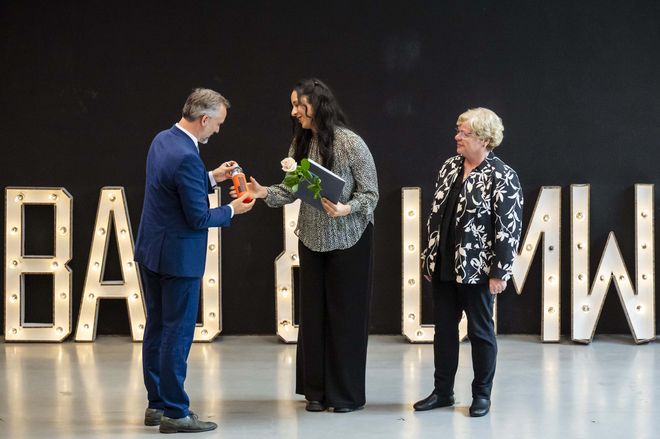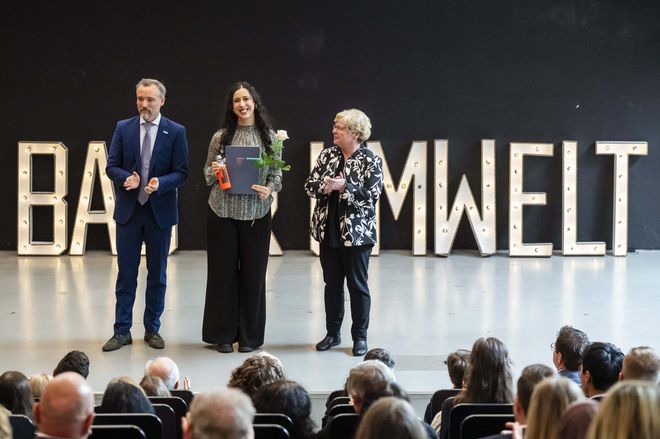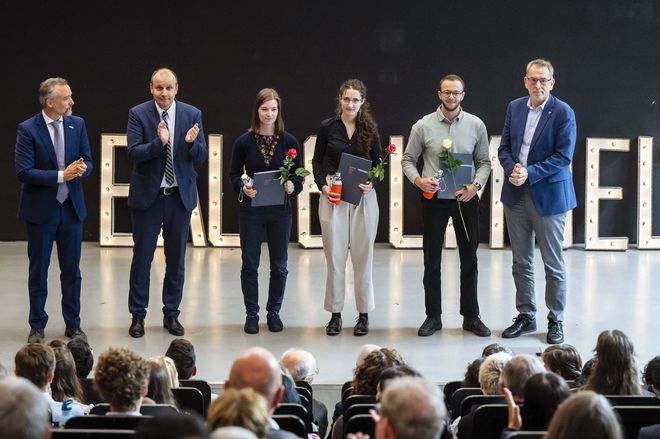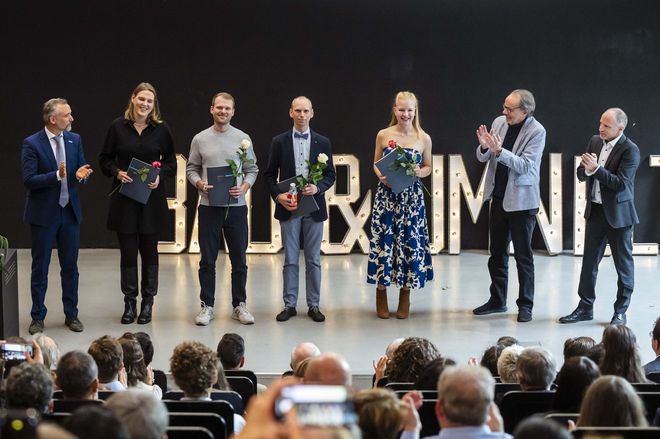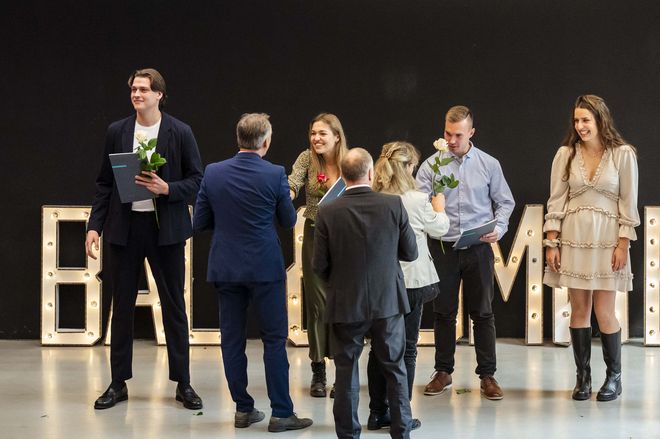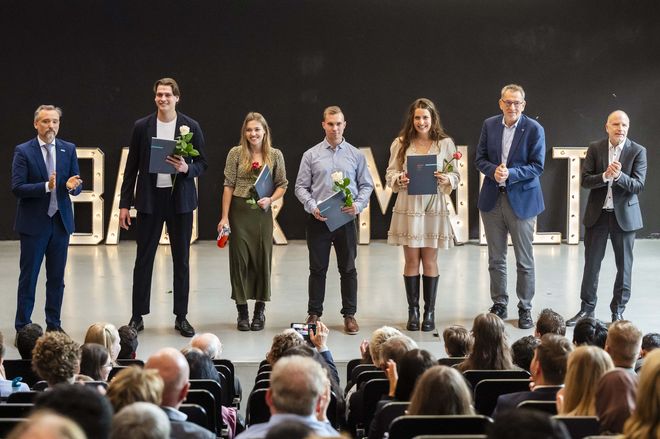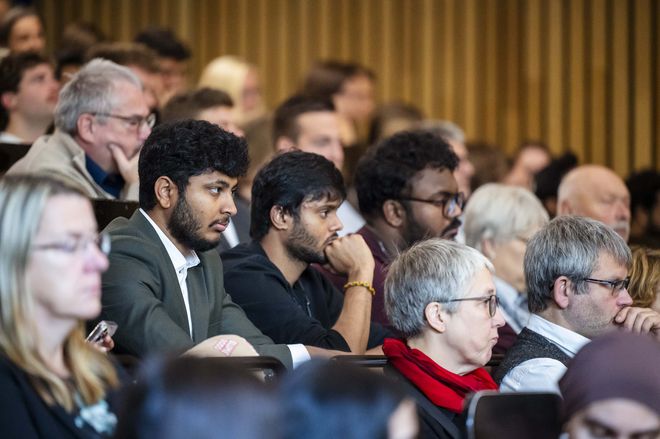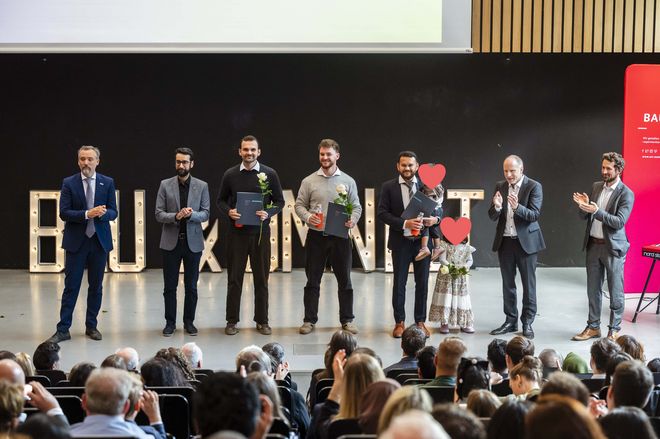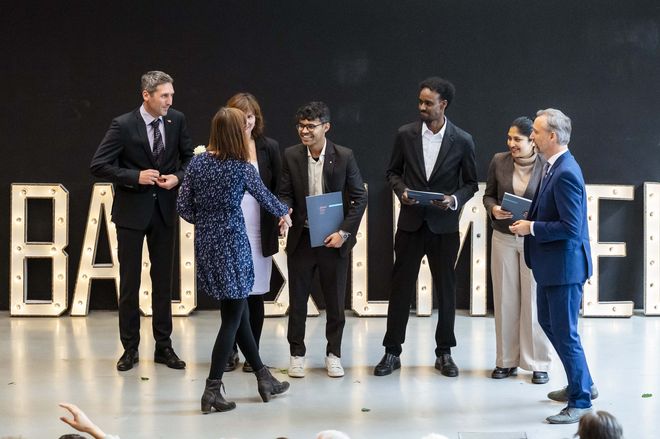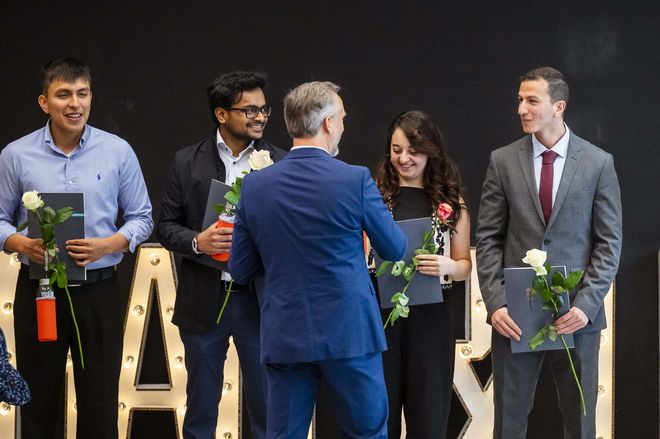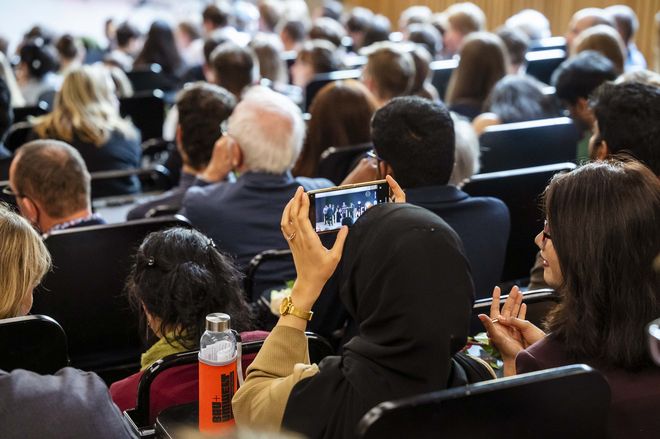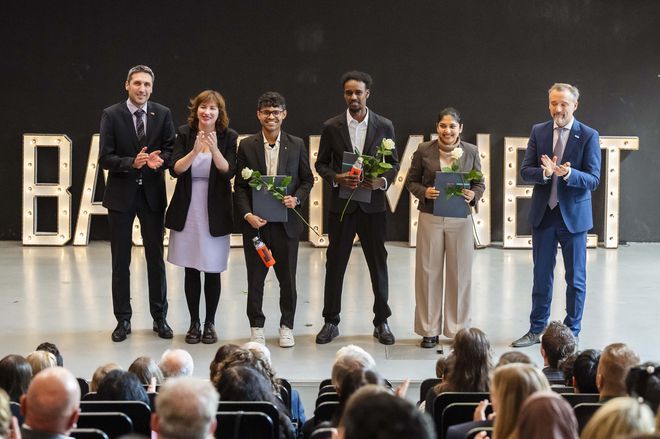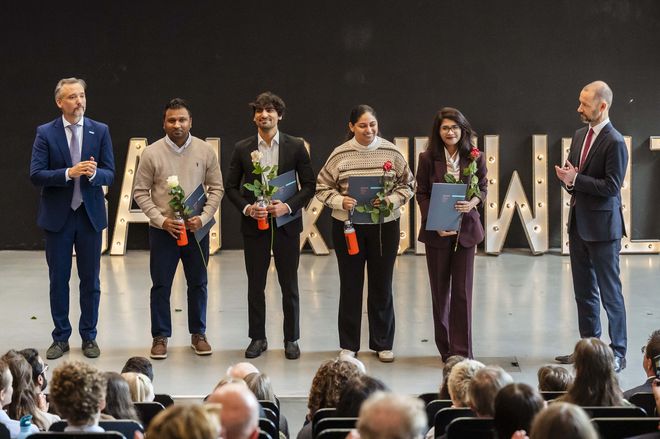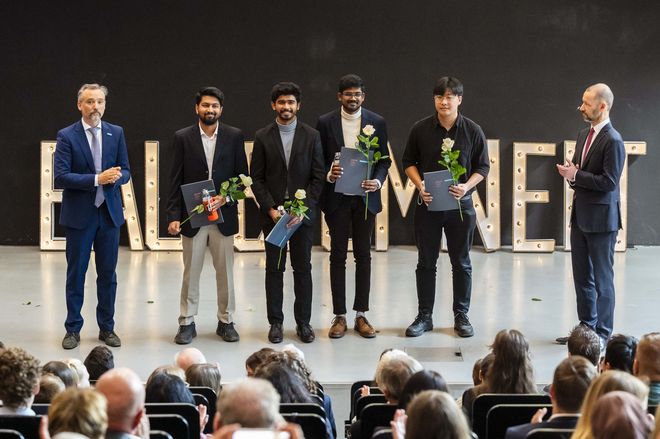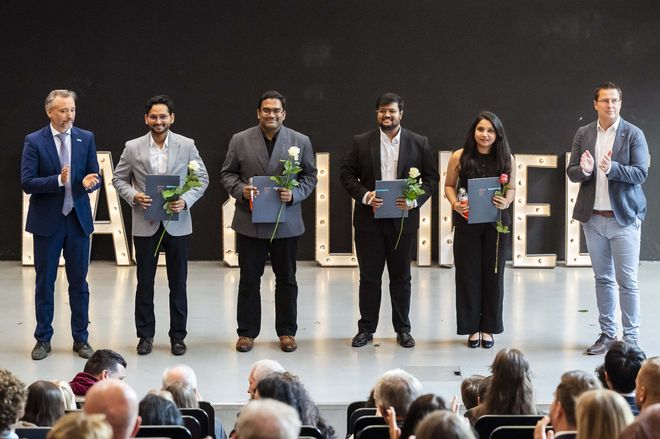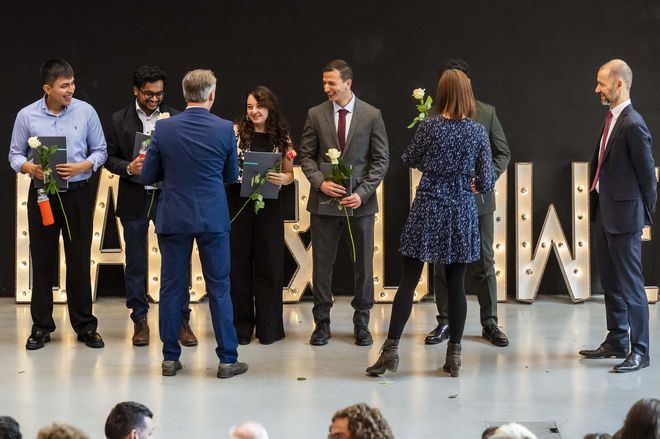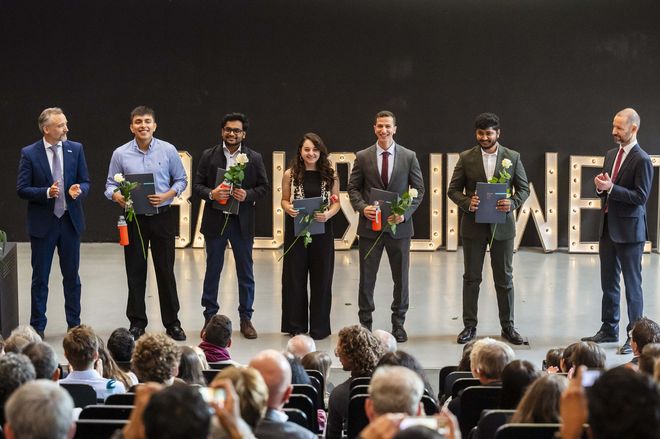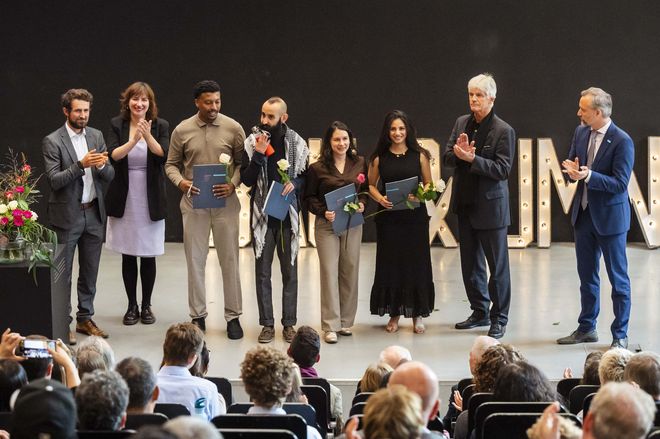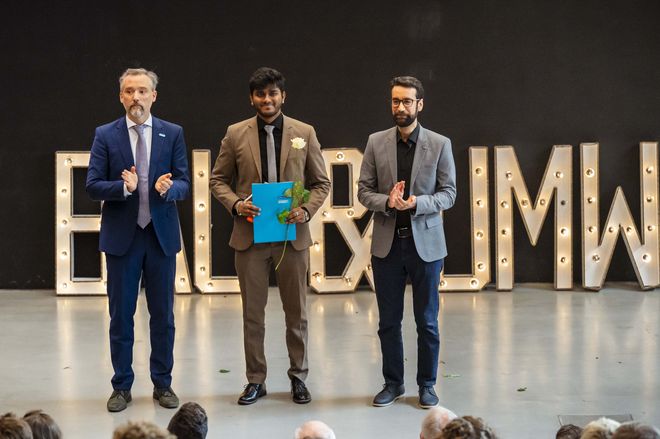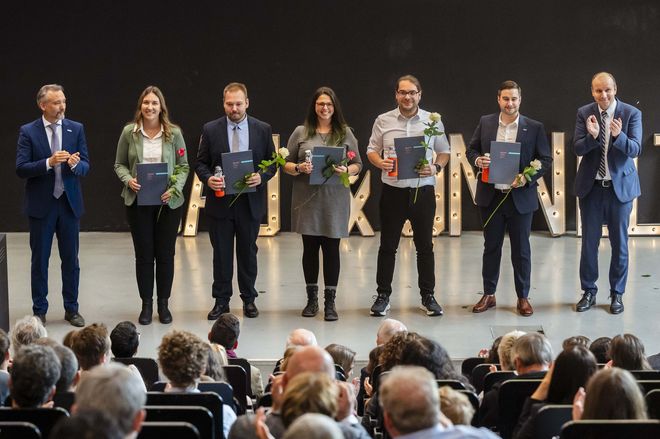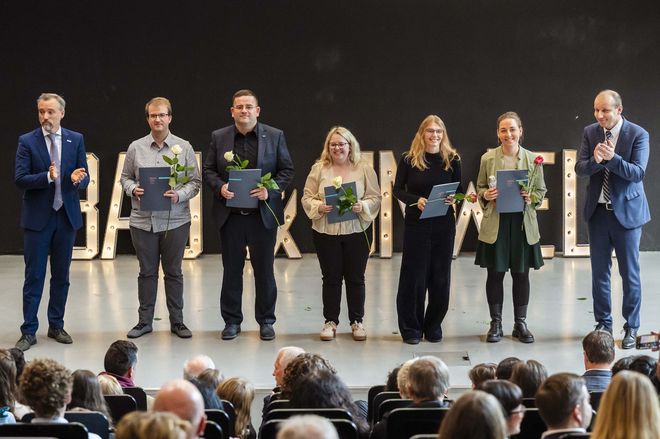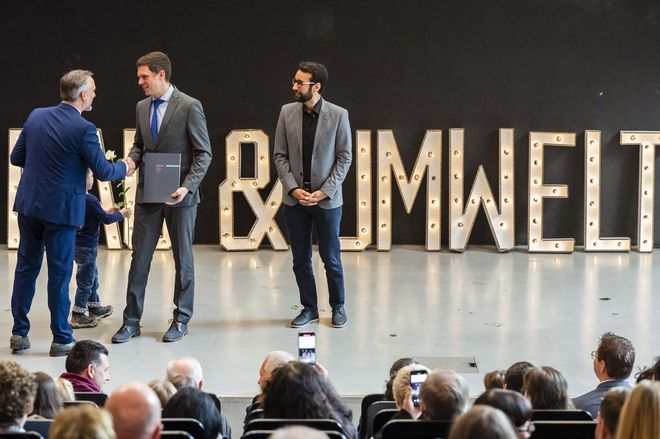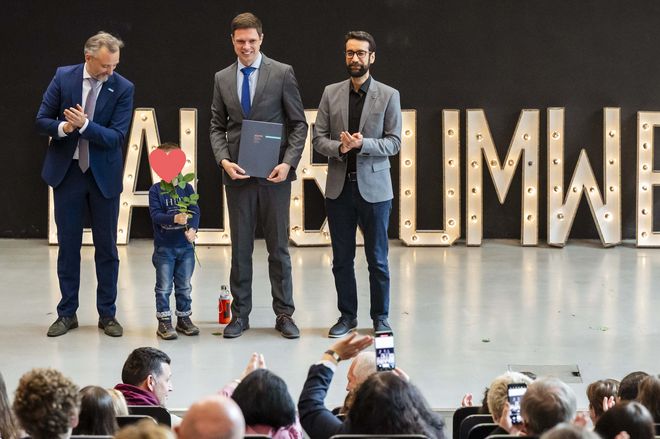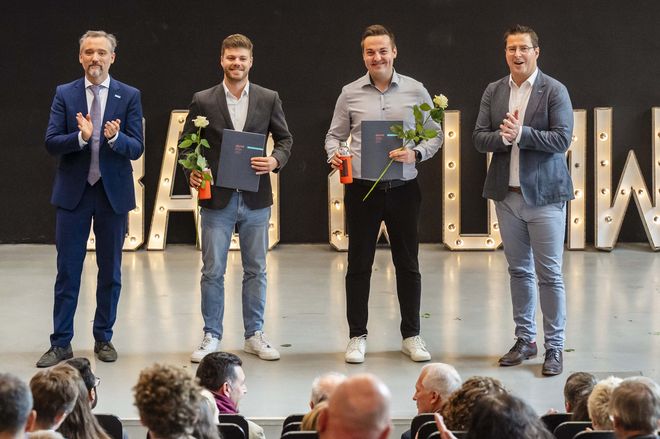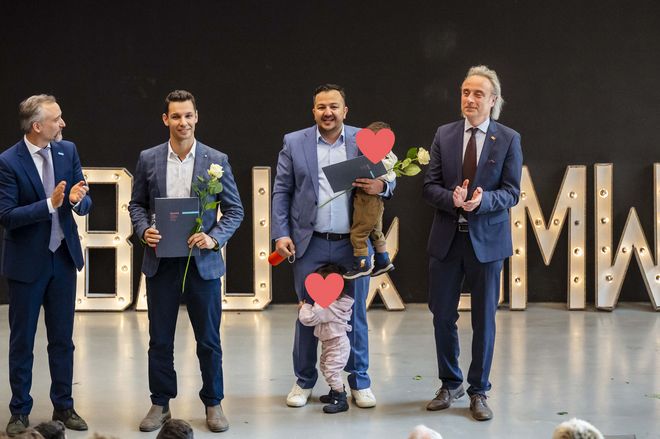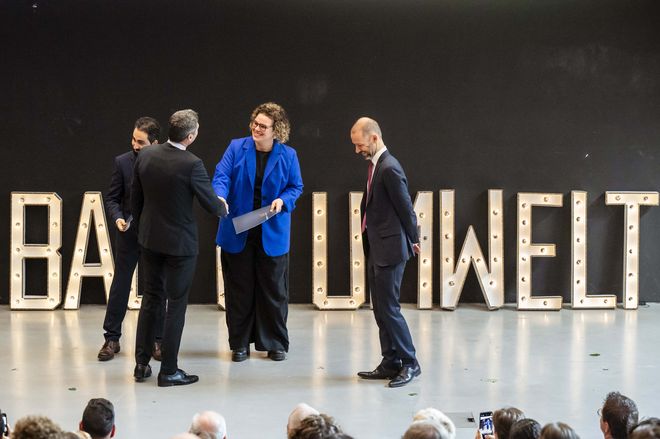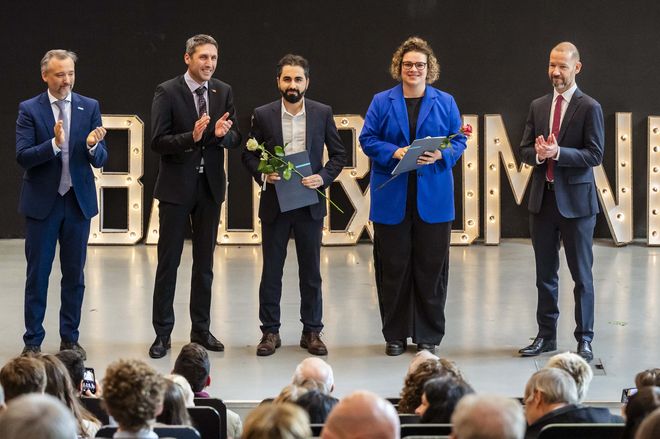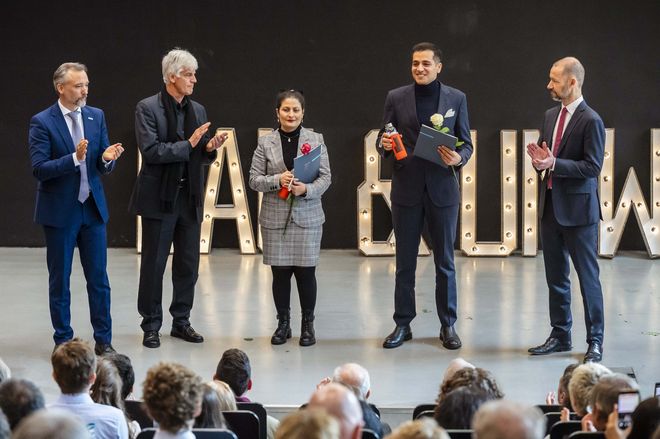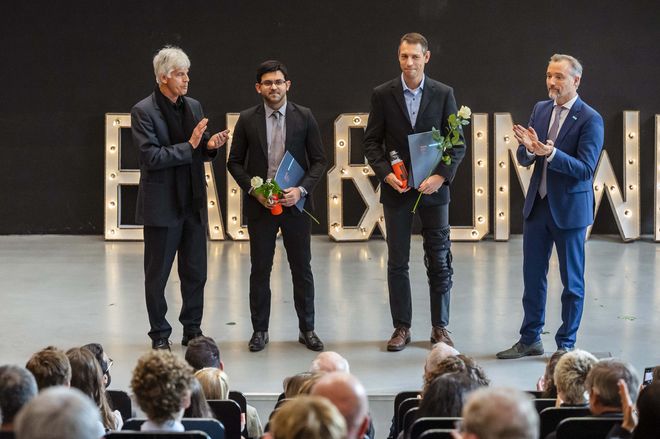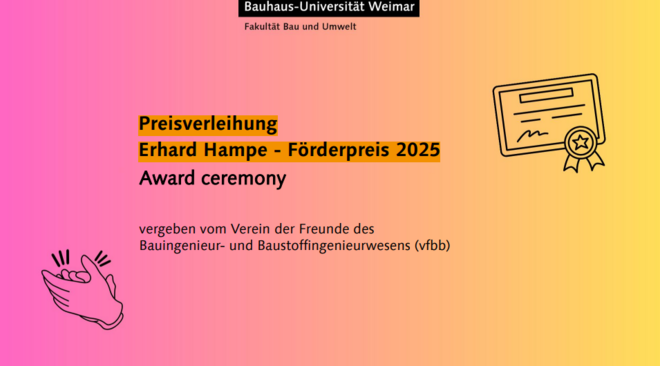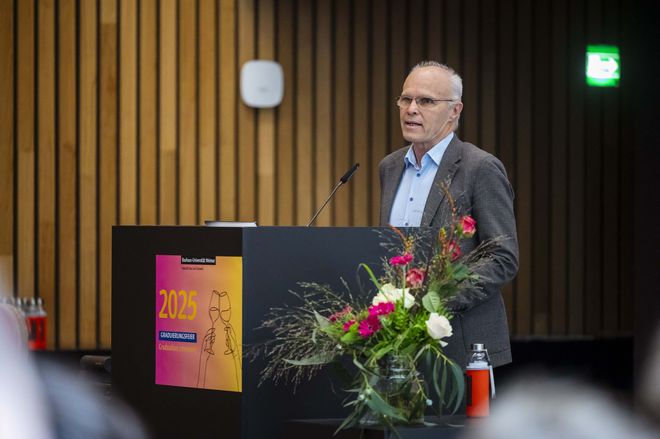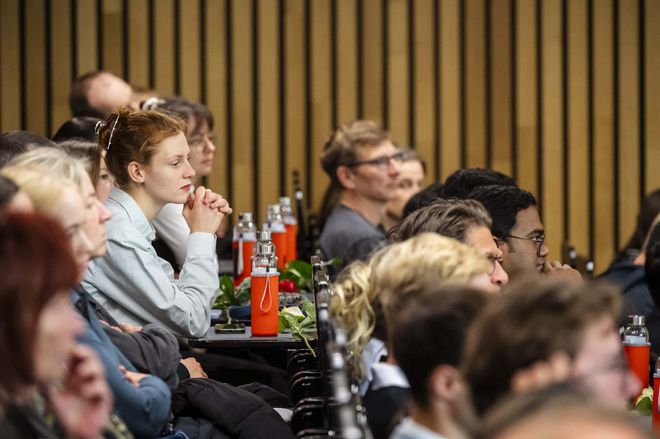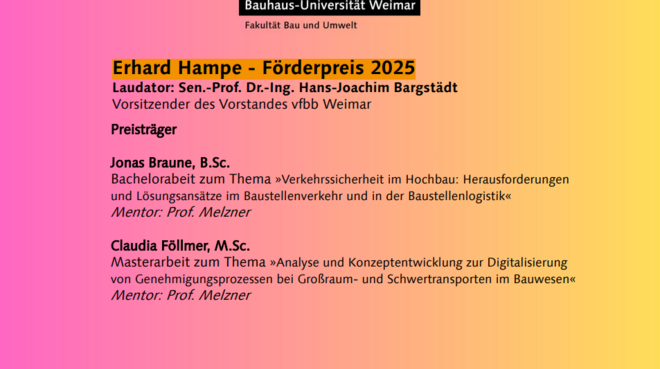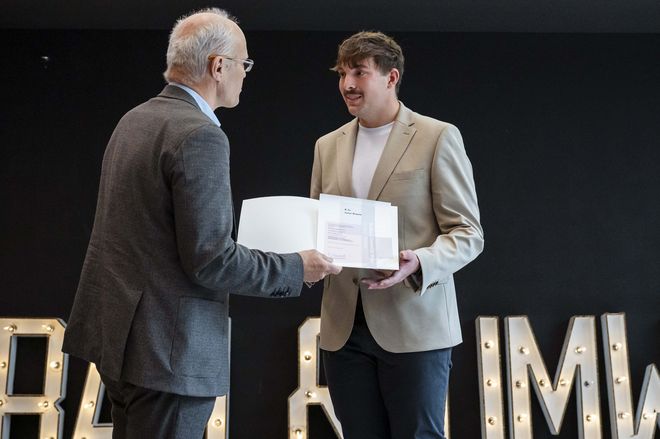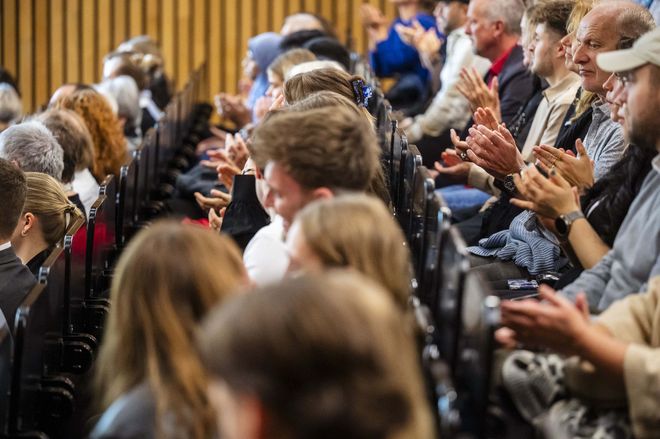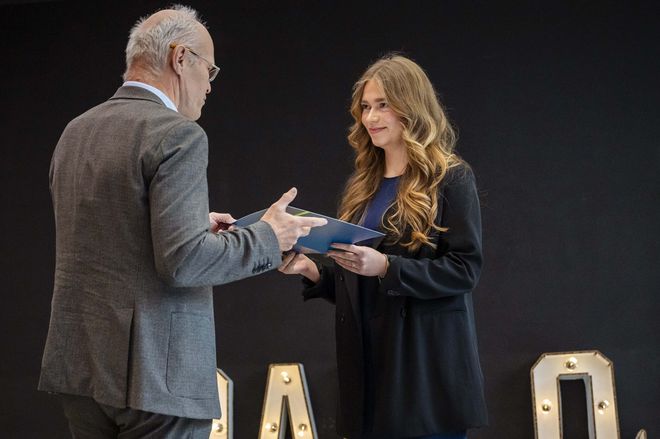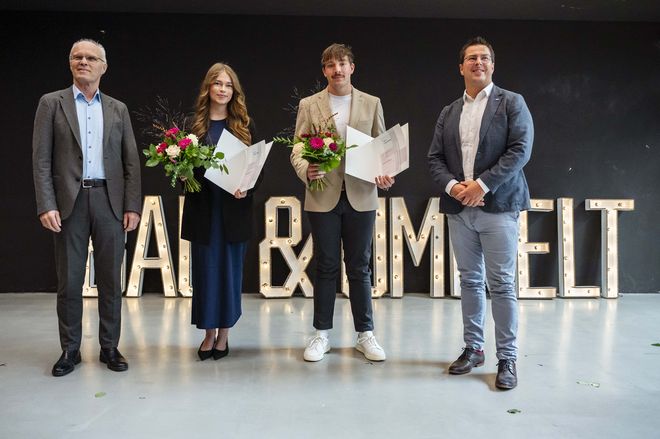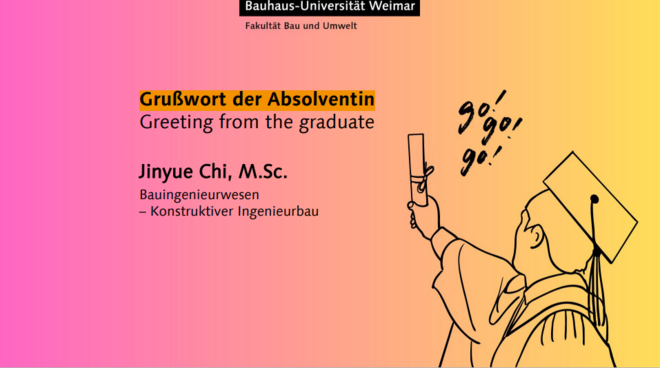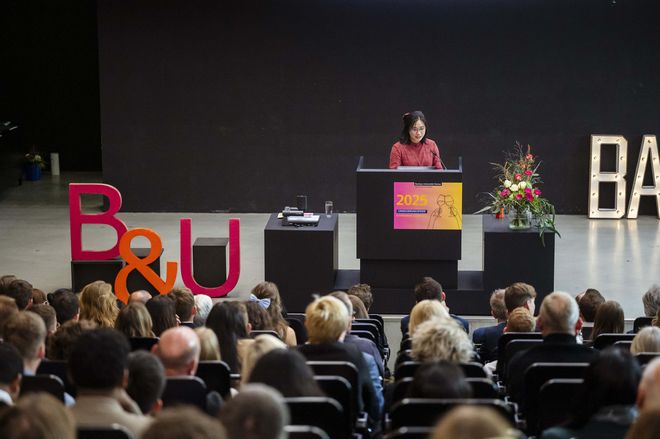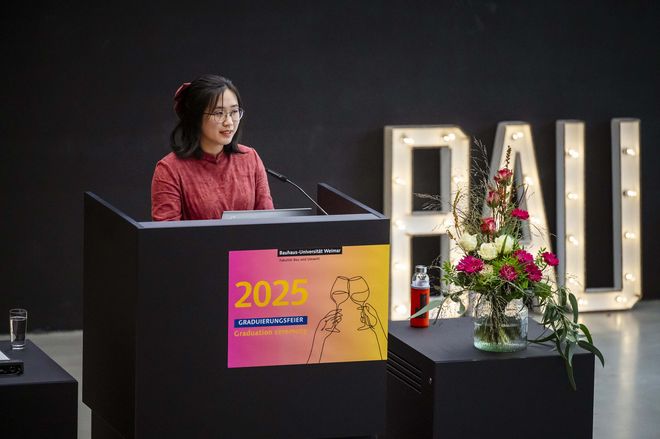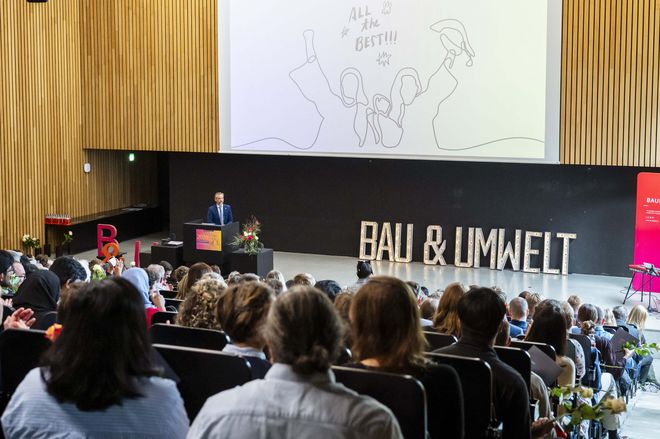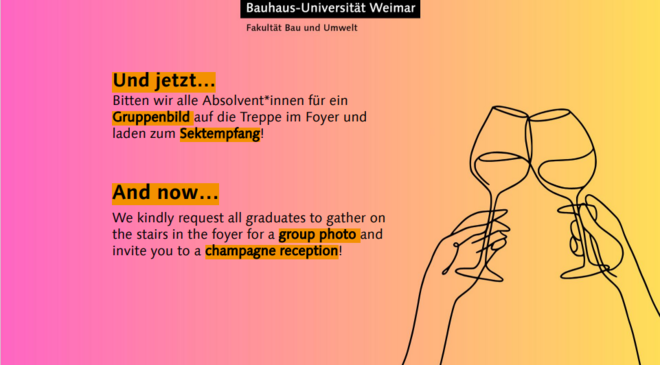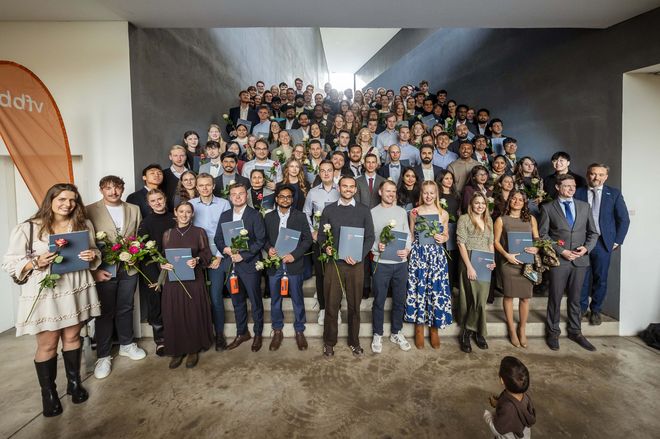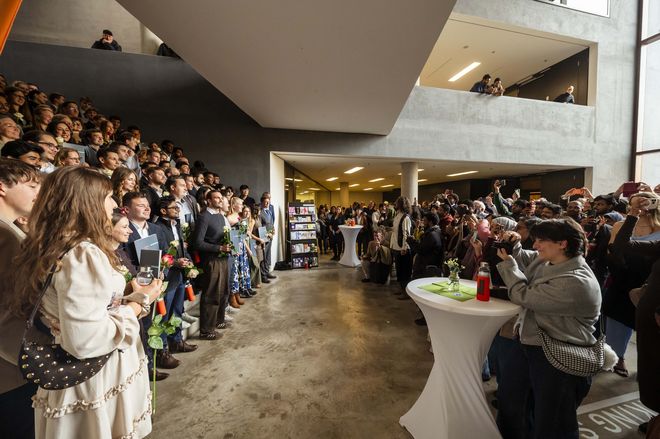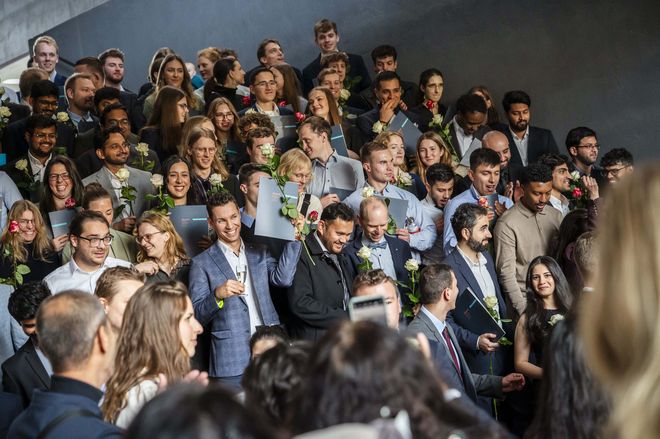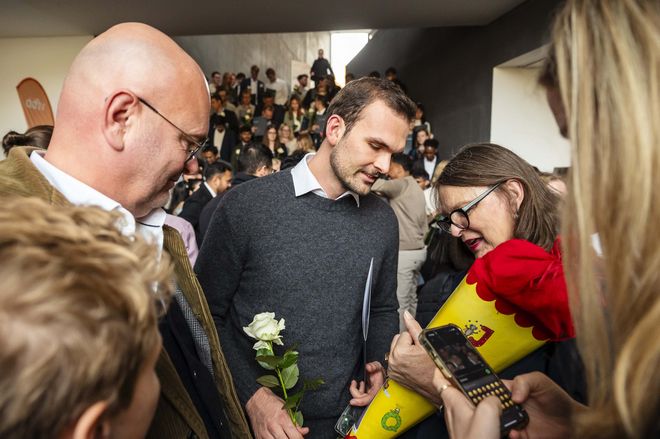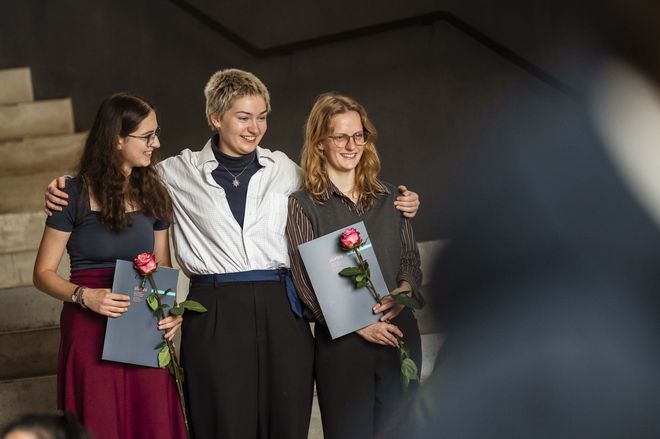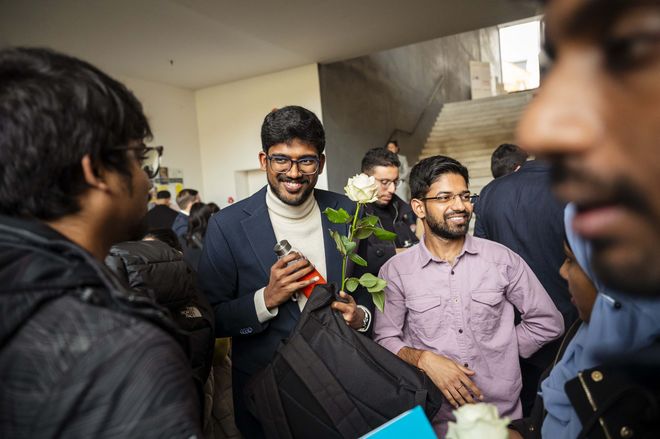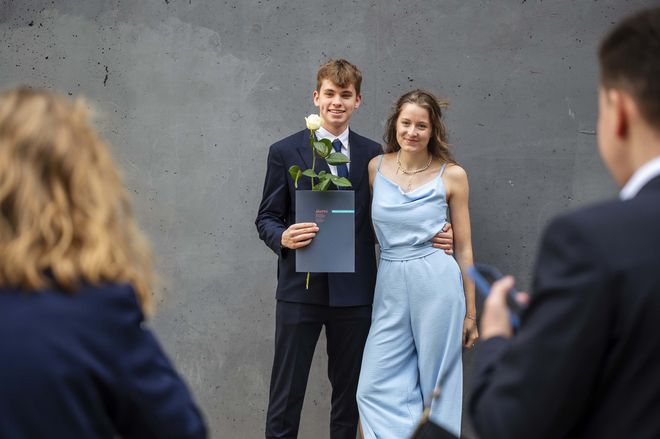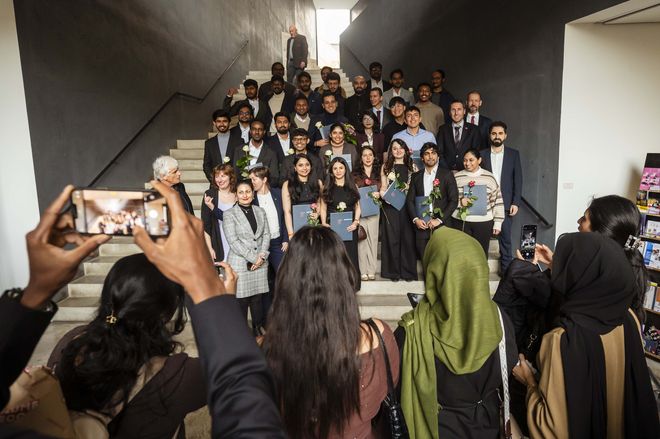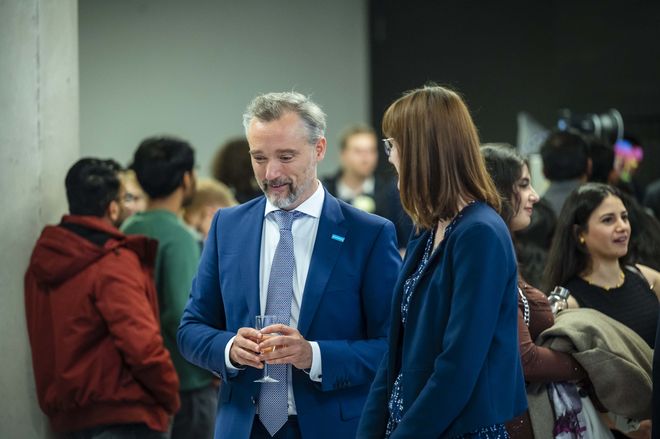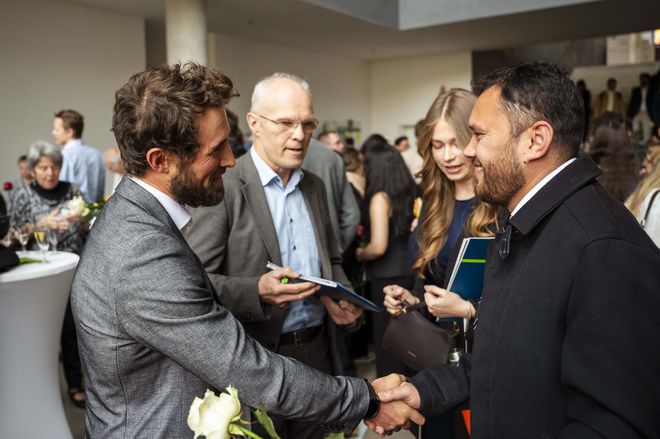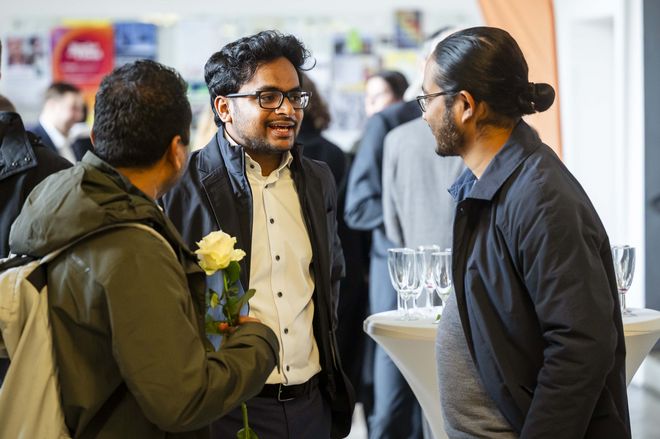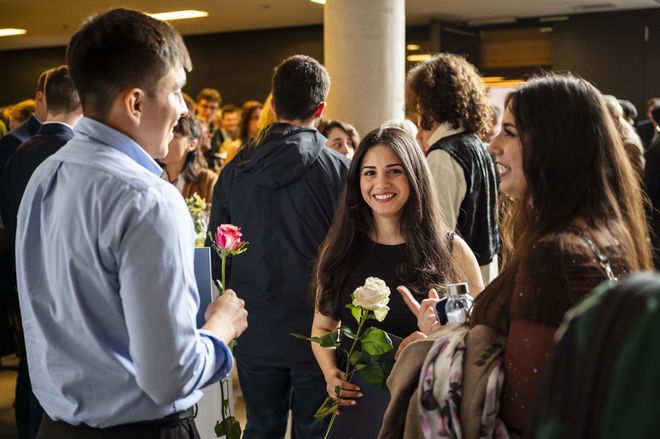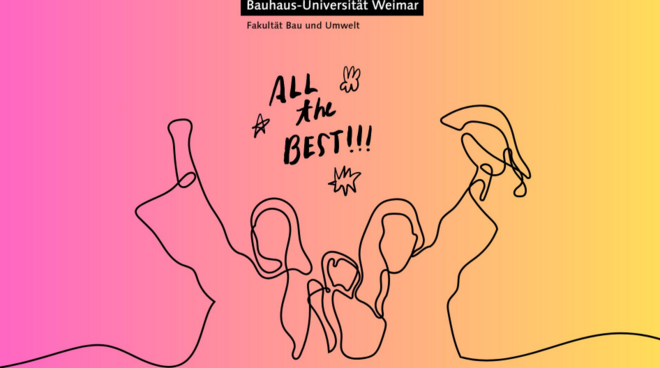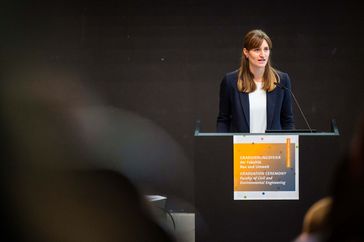Congratulations to our graduates!
On Saturday, 25 October 2025, we celebrated, applauded and said goodbye in the Maurice Halbwachs Auditorium – to a period of study full of projects, challenges and unforgettable moments. Dean Prof. Tom Lahmer hosted the event and encouraged our 224 graduates to break new ground and trust in their own abilities. Inspiring speeches by alumna Ni Michelle Ying and Master's graduate Jinyue Chi, live music by Johanna Phillip and Tim Ahlfeld, and many personal encounters made the ceremony a special highlight of the year. Senior Professor Hans-Joachim Bargstädt honoured two graduates with the Young Talent Award from the Association of Friends of Civil Engineering and Building Materials Engineering (vfbb) for their outstanding theses:
Winners of the Erhard Hampe Award 2025
Jonas Braune, B.Sc.
Bachelor's thesis on »Traffic safety in building construction: Challenges and solutions in construction site traffic and logistics«
Claudia Föllmer, M.Sc.
Master's thesis on »Analysis and concept development for the digitalisation of approval processes for large-scale and heavy transport in the construction industry«
We wish all Bachelor's, Master's and Doctoral graduates of the Faculty of Civil and Environmental Engineering all the best for their future careers – and hope that you will have fond memories of your time in Weimar!
PROGRAMME
25th October, 10 a.m. to approx. 12.30 p.m.
Maurice-Halbwachs-Auditorim, Steubenstr. 6
Greeting from the Dean Presentation of the Certificates Award Ceremony Greeting from the Graduate |
followed by group photo and champagne reception
musical accompaniment by Johanna Philipp Duo (HfM Weimar)
Speeches
Greeting of the Dean Prof. Tom Lahmer

Dear graduates,
Dear parents, dear friends and guests …
Dear colleagues,
Dear President, Peter Benz,
Dear Chancellor, Horst Henrici,
Dear festival community
(no scientific ... but festival)
I warmly welcome you to the 2025 graduation ceremony of the Faculty of Civil and Environmental Engineering.
For the English version of this speech, please follow the QR code …
I would also like to warmly welcome Ms Ni Michelle Ying, who will give the keynote speech as an alumna today. Ms Ying studied for her Master's degree in Management with us from 2016 to 2020 and has been working in project management ever since. We are looking forward to hearing her speech.
On behalf of the graduates, Jinyue Chi, who studied for her Master's degree with us, will give the speech. Many thanks in advance.
We will be accompanied musically by Johanna Phillip and Tim Ahlfeld (HfM Weimar). Let's give them a round of applause.
My name is Tom Lahmer and, in my role as Dean of the Faculty, I have the pleasure of guiding you through today's graduation ceremony programme.
I have been Dean of our Faculty for three years now, and there is no academic day, no academic occasion that I look forward to as much as the graduation ceremony. Because it really is a special day. We celebrate what you have achieved and accomplished. We celebrate magnificent degrees of all kinds: bachelor's, master's and even doctorates. 224 in total, an increase of 15% over last year!Furthermore, we have the first two graduates of the Studienbrücke programme, which makes me very happy and which I will come back to later. A large number of former or current students are here today to celebrate their personal success once again, to receive congratulations and to receive their graduation certificates! We are celebrating the second cohort of graduates whose degree certificates bear the name of the Faculty of Civil and Environmental Engineering rather than just Civil Engineering.
Let's take a look back:
Depending on whether you completed a bachelor's, master's or PhD degree with us – individually or consecutively – you must have started here with us approximately 2–3 or 5–6 years ago. The beginning, especially if you had not lived in Weimar before, was probably marked by your arrival while the city was in a state of emergency due to the Zwiebelmarkt, which usually causes the city to be overcrowded immediately before the winter semester.
You were looking for your dorm rooms and thought to yourself, wow... I've never lived so independently before... maybe it would be a shared flat... others commuted from home and enjoyed thoska-based applied probability calculations when using the train or conducted personal risk analyses when using carpooling services.
Some of you were welcomed by older fellow students during Freshers' Week and encouraged to take part in one or two beer-fuelled activities. You'll still have the photos, even if you no longer remember the rules of the games... but regardless of how you feel about it now, it must have been fun
After that, you looked for the rooms where your first lectures were to be held... where were they supposed to be? Marienstr., Coudray Str... Some of them looked very inviting, but why was there an egg in the courtyard? And why were there construction fences everywhere, behind which nothing was happening? Ah yes, the Faculty of Engineering. That must be for the practicals
Whether it was the canteen, library, computer centre, M18, main building... most places were found quickly...
Well... and other things looked, how shall we say, a bit worn... but luckily they didn't let that put them off
As we did last week, we welcomed you as newly enrolled students during the enrolment ceremony. The mayor was also happy to attend. Perhaps you can recognise yourself. Very few were unlucky enough to start at the end of the pandemic, which has preoccupied you and, of course, us at least to some extent in recent years. Fortunately, those times are mostly forgotten.
Most of the work was done indoors and it became more beautiful and elegant from year to year, as a lot of renovation work was done and is still ongoing. The effects of a new electrical installation in the lecture hall building may have had a slight negative impact on your mechanical performance... or maybe not... it will be difficult to prove. But all's well that ends well.
After a while, you may have passed through the main university building, where the Bauhaus celebrated its heyday, absorbed the spirit of the place and realised what a special place the Bauhaus-Universität Weimar, where the Bauhaus was established, is. A place of education with over 165 years of tradition and a very eventful history. You study where many other people come as tourists. You celebrated with your fellow students from other faculties until late into the night during the Summaery!
They were also part of the faculty, working and discussing in the M18 (picture M18) or in front of it (picture coffee). Friedrich Liszt would have given a lot for more life around his home and garden. Otherwise, it was never far to the canteen... whether for food or company, the trip was usually worth it.
Yes, we hope that most of them had a good time. (Picture blackboard) Of course, not all formulas, derivations and algorithms in mathematics, mechanics, statics, introduction to business administration and law, thermodynamics, composite construction, methods of reliability analysis ... and so on provided the greatest mental comfort zone ... but you tackled all these topics, got to grips with them, gained understanding and obviously also passed a large number of exams successfully.
We would like to congratulate you warmly on this achievement.
After the exams came the challenges of writing and formulating final theses, bachelor's, master's or PhD theses. Always against the clock and always with technical hurdles. A few night shifts, formatting chaos in Word or a non-compiling LaTeX will have driven them to distraction... but no matter, they got through it all and in the end it always resulted in a beautifully bound work.
Some had clear ideas about the topics for their theses and brought a topic from their practical experience with them... others were more indecisive and hoped for ready-made topics from the lecturers' drawers... Many topics are and were developed, offered and supervised by our research assistants, the so-called WiMis, a very important species in the academic structure, and they thus became part of active research and contributed valuable insights to one or the other research project. With a little luck and commitment, your name may even appear in a scientific publication. That's quite remarkable!
Well, and then this faculty changed its name. Why, exactly? Because building, living, and dealing with resources can no longer be done without a firm focus on achieving sustainability goals. The tasks and challenges are becoming more multifaceted.
Instead of
will it last?
is it affordable enough? or
can it be realised within the specified time frame?
we answer questions such as: is it sustainable enough, or could it at least be made a little more sustainable? Therefore, in addition to the purely relevant topics of civil engineering, we have consciously expanded to include environmental engineering and a focus on the environment in the context of construction. This is where we come in, and it is a specific goal of our faculty to reduce the ecological footprint of humanity in general and the construction industry in particular.
You have learned techniques and ways of thinking to further answer all these big and non-trivial questions and to make a contribution in our industry as well.
The holistic view of the interaction between construction and the environment, also in the context of natural hazards, therefore requires ever greater technical training and flexibility from those involved in building and construction processes. Answers must be found to questions such as how alternative construction variants can be evaluated technically, ecologically, economically and, where applicable, socially, which also stand up to broad public discourse.
We hope that we have been able to prepare you for this over the years.
During the graduation ceremonies, I like to revisit the motto of the Summaerys to give you something to take with you on your journey:
We last had:
Who knows (M) - 2022
Gardens (A&U) -2023
Plan B (B&U) - 2024
Attention (K&G) – 2025
So, pay attention this year... ATTENTION! ... ATTENTION... or Attention... depending on the emphasis, it takes on a different sound, a different meaning. The intention was the soft, compassionate, thoughtful, empathetic interpretation...
Pay attention... to others, to yourself... to things, surroundings, the environment... and that brings us to two important points:
• Your interaction with others
• Your interaction with the environment.
First, the interpersonal aspect: Pay attention to the people around you: Until now, this has been your family, friends from school... and yes, your fellow students too. You sweated, studied and prepared lectures together... you went out and laughed together. Did you also take care of each other?
And if so, how much? Did you lend a helping hand when the perceived fall from failing an exam was too hard to bear?
Did you offer kind words and a bar of chocolate when the thesis assignment still contained so many unknown concepts, but three-quarters of the time was already up?
And I hope that I saw mostly nods here: once, that you helped someone in need, but were able to experience that wonderful feeling when someone helped you.
Hold on to it! Take it with you! Into your new world! Your professional world! To your new colleagues. As a young professional, you will be very grateful if someone looks out for you... sees how you are getting on with your work. A good boss can do this... but so can many others. Be confident about that.
And give back when others need help!
Take care of yourself too: you made a conscious decision to study, so you want to achieve something: earn money and save the world at the same time, or vice versa. This requires a lot of hard work and commitment, dedication, creativity and, as before, the occasional night shift. But make sure you look after yourself. Pay attention to yourself. How do you feel? Is your body keeping up? You may need to take a little break to recharge your batteries so that you can then pursue your goals with even more energy.
If they get thirsty, our drinking bottles could come in handy (MERCHANDISING MOMENT, tada) and be a nice reminder of their student days. A time that now seems quite relaxed and enjoyable in comparison, perhaps even the best time of their lives, as is often said?
But also be mindful of what you do. How they deal with things and resources. Unfortunately, this is what the current state of the world demands of us. A very conscientious approach to what we take from the world... raw materials, energy, land... think once more about whether there are alternatives to how things have been done so far. Alternatives that are more sustainable, more environmentally friendly, more appreciative of the beauty and uniqueness of this planet...
Be creative... but with respect!
Our Alumni Office also does amazing work. Please leave your details here too. Just two weeks ago, we celebrated several golden diplomas here – what an occasion! 50 years since graduation.
I would now like to conclude with a few pictures of those whose thinking and scientific findings you have been able to follow here over the last few years. Experience all your lecturers once again, but perhaps from a perspective you are not yet accustomed to. They have all supported you, looked after you and wish you all the best!
A special thank you goes to our Dean's Office. Without the diligence, commitment, warmth and conscientiousness of our colleagues there, today's celebration would simply not be possible... not even in the slightest.
Thank you very much!
Ceremonial Speech by Ni Michelle Ying
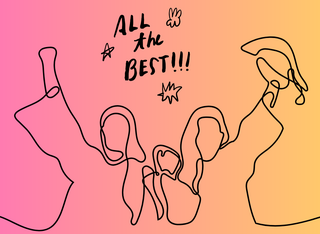
Dear Professor Dr. Lahmer,
dear professors,
dear graduates,
and of course, dear families, friends, and loved ones –
It is both a great joy and an honor to be here today. Not as a stressed-out student with a coffee cup in hand, a deadline approaching, and the feeling that the semester is somehow both too long and too short – but as someone who can now say: studying in Weimar was a formative and enriching experience. Truly, a wonderful time.
I began my Bachelor’s degree here in Weimar in Management for Construction, Real Estate, and Infrastructure – full of motivation, but also with a certain curiosity about what might actually be hidden behind such a long program title. It soon became clear that the studies were about far more than construction costs and project schedules – they were about how we build, why we build, and for whom. About how we design living environments that are sustainable, functional, and livable.
The first semesters offered an exciting mix of Excel spreadsheets, project management, and discussions about sustainability – essentially everything that would later reappear in professional life, only with more responsibility and less cafeteria food.
I have especially fond memories of evenings spent with fellow students at Reba, Salon, or, back then, at Falken – convinced that by the next day, we would reinvent the world of construction. And in a way, that is exactly what happens. Each generation of graduates brings new ideas, new solutions, and new courage to a field that depends equally on tradition and transformation.
In 2020, I completed my Master’s degree – right in the middle of a time when the world seemed to stand still. Educational institutions were closed, bars and cafés were empty, and nearly everything had shifted online. Fortunately, I was still able to defend my Master’s thesis in person with Professor Dr. Lahmer – and without anyone asking, “Can you see my screen?” or “You’re on mute.”
My initial plan was to move back to my hometown of Hamburg. But then I thought: no – in Hamburg, I would pay twice as much rent and sit in a home office without meeting new people. So, I decided to stay in Weimar and began working in project management within the media sector. It was a creative time – and, in hindsight, a very good decision.
A year later, in 2021, I joined kappes ipg GmbH, an architecture and engineering firm with offices in Stuttgart, Berlin, Hamburg, and Munich. I work there in project management and construction supervision. In other words, I am the person who tries to balance costs, schedules, and quality – the famous “magic triangle” of the construction industry. On good days, it works beautifully; on others, it feels more like a structural model that remains stable only as long as no one touches it.
My current project is a listed building from the 1920s in Berlin – a structure with great history, character, and, as it turns out, a certain degree of stubbornness. Originally designed as an office and commercial building, it later became known for its ballroom, the Femina-Palast, which served as a jazz club. Artists such as David Bowie and Ella Fitzgerald once performed there.
Most recently, the building operated as the Ellington Hotel, which closed in 2021. It was then set to be converted into flexible office spaces, with the building’s shell and volume preserved and the interiors carefully gutted in accordance with heritage regulations. During demolition – and indeed throughout the construction process – our role is to ensure that the project proceeds as planned. We coordinate contractors and suppliers, monitor schedules and budgets, oversee safety and environmental protection measures, and document progress for approvals and subsequent trades.
Then, something unexpected happened: insolvency proceedings were initiated against the client, and the project came to a halt for around one and a half years. Recently, however, things have begun to move again. A new investor has taken over, planning to convert the building back into a hotel.
We are now supporting the planning and construction phases – coordinating project timelines, liaising between the design team and authorities, safeguarding budgets and schedules, and ensuring compliance with building and heritage protection requirements. In this building, both the façade and the windows are listed. The natural stone façade made of travertine was recently restored. As site supervisors, we oversaw the execution and approved the works – a moment that truly reminded me of how much craftsmanship, patience, and responsibility are embedded in such a structure.
It is certainly a project full of surprises. When working on existing buildings, one never knows what lies behind the next wall – sometimes an elegant stucco element, sometimes a historic beam, or, even more exciting, a pipe that dates back to the Kaiser’s era. But that is precisely what makes this profession so fascinating: we work with both history and the future at once.
We mediate between architects, craftsmen, authorities, investors, and preservationists – and we learn quickly that communication on a construction site can be the most important tool of all. The challenge, and the beauty, lies in preserving historic character while creating contemporary solutions that meet today’s standards of sustainability, comfort, and functionality.
Another project you may know is the new ZEISS High-Tech Campus in Jena, near the Jena West train station. This innovative complex brings together office, laboratory, technology, and production spaces under one roof. We were involved in the tendering and awarding stages. The structural shell is now complete, and interior construction has begun. The complex is modular in design, divided into several construction phases – an approach that allows for gradual implementation and ensures sustainable, forward-looking development of the site. You can see the vision coming to life.
A completely different project was the construction of a Buddhist temple in Berlin, completed in 2023 – a building full of tranquility and symbolism, a deliberate contrast to the pace of large-scale projects. Of course, not everything there was as peaceful as meditation – construction sites have their own rhythms: delivery schedules, craftsmen, and unpredictable weather. But that is precisely what makes our profession so fascinating: through planning, teamwork, and sometimes a touch of improvisation, something emerges that is harmonious, functional, and meaningful.
New construction creates the future; heritage preservation keeps history alive – and somewhere in between lies the art of connecting both.
Many of the skills I use in my daily work, I learned here in Weimar – often without realizing it at the time: analytical thinking from the business modules, communication and teamwork from group projects, and above all, the ability to think across disciplines – combining technology, economics and design.
And that, I believe, is what truly defines the Bauhaus University: here, we do not simply learn to plan buildings or understand numbers – we learn to connect people and ideas. That is one of the greatest strengths of this program, and something that cannot easily be taught later in life – but which proves invaluable in practice.
Dear graduates, you have accomplished a great deal over the past years. You have completed projects, met deadlines, overcome challenges, and perhaps endured a few sleepless nights along the way.Today is the moment to pause – and to be proud. Truly proud.
Whether you now enter professional life, begin a doctorate, or take some time to rest and reflect: you have achieved something that no one can ever take away from you. You have proven that you can persevere, even when things become difficult – and that quality will carry you far in your careers.
Because in professional life, things rarely go exactly as planned – and that is precisely what makes it exciting. We plan, we manage, we monitor – and sometimes, we simply improvise with style. But perhaps the most rewarding part is this: every project tells its own story. You witness how ideas, plans, and teamwork become something real, and one day you stand before a completed building and think: I contributed to this. That feeling – of having helped create something tangible – is priceless, and no Excel spreadsheet in the world can measure it.
You will find that responsibilities grow, mistakes happen, and questions remain. But that is when you will realize – this education has prepared you. Not because you know all the answers, but because you have learned to ask the right questions.
Finally, I would like to leave you with one thought: wherever your path may lead, remain curious, remain courageous, and never lose your sense of humor. The world of construction needs people who think deeply, think differently, and think ahead.
I wish you all success, happiness, and serenity on your future journey.And perhaps, one day, our paths will cross again – on a construction site, in a project meeting, or at another graduation ceremony – as colleagues.
Congratulations on your graduation, and all the very best for the future!
Greeting from the Graduate Jinyue Chi, M.Sc.
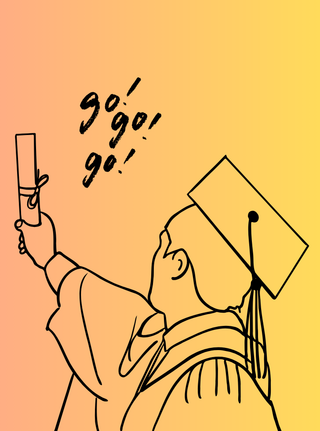
Plan A Failed? Plan B Prevails!
Dear fellow graduates,
dear professors and guests,
today is a day of joy, and we have gathered here to celebrate our achievements together. The path that brought each of us to this moment has certainly been different—filled with individual challenges, decisions, and experiences. But today, we all sit here as part of the Faculty of Civil and Environmental Engineering, proud of what we have accomplished.
As a graduate of this class, I am honored to welcome you all to this special occasion. I would like to take a moment to look back with you on my life in Germany and at the Bauhaus University—my very own version of “Plan B.”
You can probably tell from my name that I am not from Germany. Like about 30 percent of the students at Bauhaus University, I am an international student. Eight years ago, my family took a bold step to give me better educational opportunities: they decided to give up the traditional school path in China and made it possible for me to come to Germany. Life here, however, was not always easy. In addition to the typical culture shocks—such as cold dinners, socks with sandals, or the famous “delayed train”—there were also bureaucratic hurdles, like endless paperwork when applying for a residence permit. And of course, the German language itself was a real challenge. I still ask myself sometimes: is it der, die, or das Nutella?
Originally, I wanted to become an architect. I was fascinated by the idea of using my creativity to design modern buildings. Unfortunately, my application portfolio failed to convince the jury at Bauhaus University—so my “Plan A” didn’t work out. But since I had already fallen in love with the city of Weimar, I decided to stay and take a new direction—my “Plan B”: civil engineering. After all these years, I can say with confidence that I have never regretted that decision. As the Faculty of Civil and Environmental Engineering says in its 70-year anniversary motto: Plan B is exactly what I needed.
My studies, however, began right in the middle of the pandemic, and things turned out quite differently from what I had imagined. In-person classes were rare, contact with other students was limited, and the vibrant campus life I had hoped for was almost nonexistent. It was, without doubt, a challenging time for everyone. But despite the difficulties, there were also amusing and memorable moments that lightened up our daily routines: technical glitches during online lectures, blurry camera angles from professors, and of course, the legendary cafeteria tent in the parking lot—an unforgettable “temporary solution” that not everyone had the chance to experience (and honestly, once was probably enough!). Fortunately, I later got to experience real campus life—with all its wonderful and demanding sides. The 7:30 a.m. lectures, four times a week, the endless lines in the newly renovated cafeteria, or the perpetually booked-out study carrels in the library—these are all memories I will never forget.
One of the most adventurous moments of my entire studies happened during my bachelor thesis phase. Just one week before the submission deadline, my only laptop decided to quit—and of course, my digital version wasn’t fully finished. Luckily, I had an alternative backup plan: a recent copy on a USB stick that saved my work at the very last moment. I sincerely hope that none of you ever have to experience such a crisis—but if you ever write another thesis, please remember this: never underestimate the power of a backup!
Beyond the academic side, there was so much more to discover during my time here. One project that truly enriched my studies was the Concrete Canoe competition. At first, it might sound a bit strange—a canoe made of concrete? Can that even float? Of course it can! Archimedes’ principle provides the physics behind it and allows us students to combine creativity with technical knowledge while putting our understanding of concrete to the test in a practical way. Working in such a large team connected students from different semesters, each contributing their best—whether in mixing, construction, or paddling. I was also able to bring my creative passion from my original dream of becoming an architect into the project by joining the design team. At the 2024 regatta, our team celebrated several wonderful successes, including first place in the design category. For me, that was yet another confirmation that my “Plan B” truly hit the mark.
Finally, I would like to take this opportunity to express my heartfelt gratitude. My sincere thanks go to all professors and research assistants who guided us—helping us understand complex topics and supporting us through our theses. Without your dedication, this achievement would not have been possible. I also want to thank my dear fellow students. You made the journey not only manageable but also memorable. Thank you for every late-night study session, every shared moment of stress, and every laugh in between. And above all, I want to thank my parents. You made it possible for me to come to Germany and supported me in every stage of my studies. I am incredibly happy to have you here today to celebrate this milestone with me.
So, to all my fellow graduates: Congratulations! You can truly be proud of yourselves. The road to the future now lies ahead of us—and remember: wherever we are, there is always an alternative “Plan B” that might just lead us exactly where we are meant to go.
Thank you very much.


